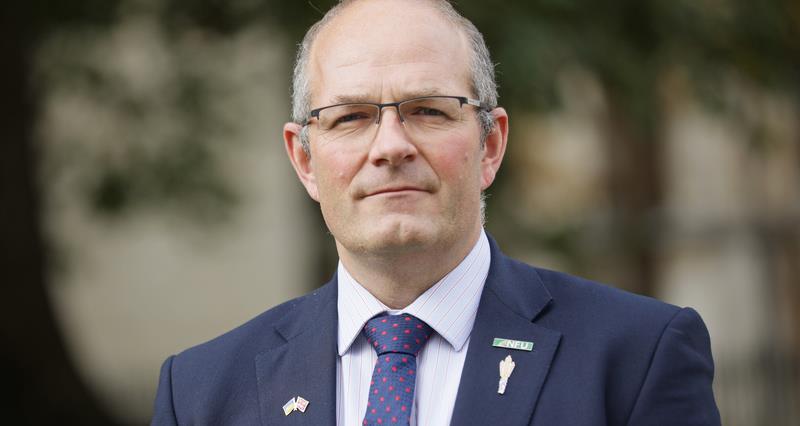New measures include changes to APR (Agricultural Property Relief) that are likely to impact significant numbers of farm estates, including small and medium-sized enterprises, and an above-inflation hike in the NLW (National Living Wage), with the rate for over 21s increasing 6.7% to £12.21 from April.
Defra also said it would accelerate the tail-off of direct payments for the largest recipients – and set the reduction on the first £30,000 of all payments at 76% for next year, with 100% reduction beyond that.
These changes will add to the cost of producing food at a time when hard-pressed British farmers cannot absorb it, meaning either the supply chain or consumers will end up bearing the brunt.
British family farms are already stretched to breaking point after a decade of tightening margins, cost inflation and extreme weather events, and this budget could be the final straw for many.
More uncertainty for British farmers
Reacting to the announcements, NFU President Tom Bradshaw said: “This Budget not only threatens family farms but will also make producing food more expensive. This means more cost for farmers who simply cannot absorb it, and it will have to be borne by someone. Farmers are down to the bone and gristle, who is going to carry these costs?
“It’s been a bad budget for farm confidence, which is already at an all-time low. After today farmers, including tenants, have more uncertainty and more worry, not less.
“When you look farmers in the eye and make them a promise, keep it.
“The shameless breaking of those promises on Agricultural Property Relief will snatch away much of the next generation’s ability to carry on producing British food, plan for the future and shepherd the environment.
“It’s clear the government does not understand that family farms are not only small farms, and that just because a farm is a valuable asset it doesn’t mean those who work it are wealthy.
“Let’s not sugar-coat this, every penny the Chancellor saves from this will come directly from the next generation having to break-up their family farm.
“This is one of a number of measures in the Budget which make it harder for farmers to stay in business and significantly increase the cost of producing food.”
“When you look farmers in the eye and make them a promise, keep it.”
NFU President Tom Bradshaw
Good news for those hit by flooding
There is some good news within the Budget, as those hit by devastating rainfall earlier this year will ‘immediately’ have access to the £60 million Farm Recovery Fund, an increase of £10 million.
The agricultural budget for England has also been maintained, with Defra confirming this year’s budget to be £2.6 billion to reflect the underspend from the previous government.
Both announcements followed sustained NFU campaigning that saw meetings with ministers, MPs and departments run right up to Budget week.
�ʼһ���had written to the Chancellor and the PM urging them to hold true to commitments made in opposition and in the early days of the administration, and rallied the UK farming unions for a joint call on APR.
More than 3,450 people used an online NFU tool to write to their MP calling for a fair deal for farming and growing, with 350-plus MPs hearing from constituents why APR is of critical importance to family farms, and why an extended, multi-annual agriculture budget is crucial to safeguard the nation’s food security and environmental aspirations.
In the letter to Sir Keir Starmer, NFU President Tom Bradshaw had stressed that an “unacceptable” underspend in the agriculture budget was a direct result of new schemes not being ready - and not any lack of need.
See a full timeline of our work for a fair deal for farming and growing at Agriculture budget – a timeline of NFU lobbying.
�ʼһ���is analysing today’s announcements, and this page will be updated in due course.
What else was in the Budget?
- Changes to APR mean that, from April 2026, inheritance tax will apply at an effective rate of 20% on all farm assets beyond a £1m threshold.
- The National Living Wage for over-21s will increase from £11.44 to £12.21 from April, a rise of 6.7%. Estimates from the Low Pay Commission (LPC) in September had suggested a range of £11.82 to £12.39 with a central estimate of £12.10. �ʼһ���had made a full submission to the LPC consultation earlier this year, emphasising the need for pay pragmatism after an unprecedented 18 months. The National Minimum Wage rate for those aged 18 to 20 will increase by 16.3%, to £10 an hour, while apprentices and under-18s received the biggest raise, from £6.40 to £7.55 an hour, or 18%. The Chancellor said that was part of a “move to single adult rate, phased in over time”.
- The budget came after the government had ruled out increasing taxes on ‘working people’ in its manifesto, including Income Tax, National Insurance (NI) and VAT. It did, however, feature a change to the employer portion of National Insurance (NI) contributions, which will rise from a rate of 13.8% to 15% from April 2025. The threshold at which businesses start paying National Insurance on a workers’ earnings will also be lowered from £9,100 to £5,000, although the Chancellor promised turnover-based exemptions for smaller businesses.
- In a surprise move, the thresholds at which people start to pay NI or Income Tax , which had been frozen since 2021, will be “uprated in line with inflation once again” from 2028-2029. This should mean fewer people are drawn into higher rates as their wages increase.
- Relief on business rates for the retail, hospitality and leisure industry will continue in 2025/26, but at 40% and not the current 75%, up to a cap of £110,000 per business. This could apply to some farm diversifications.
- The Chancellor said she would maintain the freeze on will freeze fuel duty, and the 5p cut introduced in 2022, for another year. Meanwhile, a £2 cap on bus fares was replaced by a £3 cap funded to the end of 2025.
- The lower rate of Capital Gains Tax will rise from 10% to 18%, and the higher rate from 20% to 24%. The rates on residential property will remain at 18% and 24%.
- The first Labour budget in 14 years had sought to find billions of cuts and tax rises to address a £22bn ‘blackhole’ the government says it inherited, and to fund significant investment in public services, including a £22.6bn increase in the “day to-day” health budget, £5bn for housing, and £2.3bn for schools.
Find more on the Autumn Budget

Watch again: Budget breakdown – what you need to know

